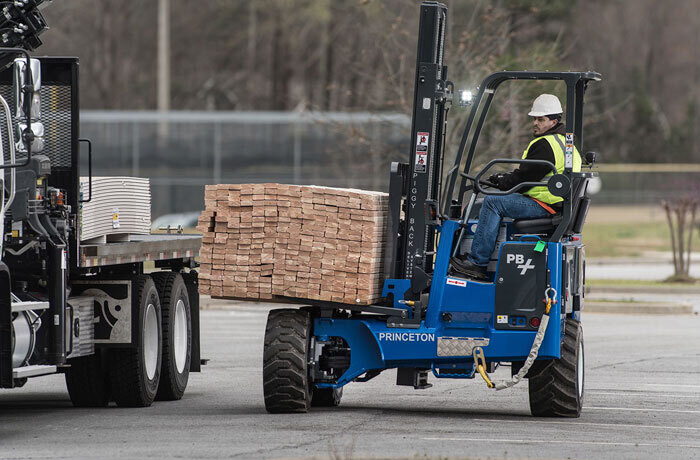How the Waste Management Industry Uses Piggyback Forklifts
How the Waste Management Industry Uses Piggyback Forklifts
.jpg)
Forklifts are an effective tool that has applications across many different industries. There are few industries where this is more true than the waste management industry. Waste management involves moving large quantities of trash, waste, recyclable materials, and other heavy substances that cannot be efficiently moved by hand.
Choosing the right forklift can dramatically impact a waste management facility's ability to effectively process their intake. Princeton PiggyBack® forklifts, for example, can be very effective because they are truck-mounted and more portable and flexible than more traditional options.
In this post, we will discuss how the waste management industry uses piggyback forklifts including for on-site transportation, sorting and handling, and improving safety. Keep reading to learn more!
.jpg)
Forklifts in Waste Management and Recycling
Forklifts play an essential role in waste management and recycling operations, efficiently moving large and heavy materials. In these environments, dealing with bulky items such as metal scraps, cardboard bales, and electronic waste is common. Forklifts enable workers to transport these materials swiftly, reducing the risk of injury and increasing productivity. Piggybacks can lift and carry weights up to 8,000 lbs at varying heights, meaning they are the most effective option for moving variable masses.
In waste management, forklifts assist in transferring waste between bins and trucks, ensuring that sites remain organized and compliant with regulations. By streamlining the movement of heavy materials, forklifts enhance workflow and contribute to sustainable practices in waste disposal.
Let's take a closer look at a few key areas where forklifts contribute.
On-Site Transportation
On-site transportation plays a crucial role in enhancing efficiency at disposal and recycling facilities. When a waste collection truck arrives, the swift detachment of the piggyback forklift is essential for unloading waste materials promptly. This quick transition minimizes downtime for the collection truck, allowing it to return to service faster.
By utilizing the piggyback forklift, workers can efficiently transport heavy loads directly from the truck to the designated disposal or recycling areas. This method not only accelerates the unloading process but also ensures safe handling of the materials, reducing the risk of spills or accidents.
Effective on-site transportation through piggyback forklifts streamlines operations, enhances productivity and contributes to a more sustainable waste management system. The faster the unloading process, the quicker the truck can be back on the road, facilitating more frequent collections and improved overall service efficiency.

Sorting and Handling
Sorting and handling waste and recyclable materials is a crucial process at recycling facilities, ensuring efficient processing and reducing environmental impact. At the heart of this operation are piggyback forklifts, which are adept at transporting large containers filled with sorted recyclables, including paper, plastics, and metals. These specialized forklifts enable workers to easily move materials to their designated processing lines, facilitating a streamlined workflow.
In addition to transporting sorted recyclables, piggyback forklifts also play a vital role in managing materials that require further processing. Whether it’s shredding for smaller particle sizes or compacting for easier storage, these forklifts help ensure that materials are transferred properly for the next stage in the recycling process. Their versatility and efficiency in handling bulky loads make piggyback forklifts an invaluable asset in the sorting and handling of recyclables, ultimately contributing to more effective recycling practices and a greener planet.
Improved Safety
Improved safety in workplaces handling heavy and bulky waste materials is paramount and piggybacks significantly contribute to this effort. By utilizing equipment like forklifts, conveyors, and automated waste handling systems, the manual handling of heavy items is minimized. This reduction in physical labor helps lower the risk of injuries, such as strains or sprains, which are common in environments where heavy lifting is required.
Maintenance and regular inspections of equipment further enhance workplace safety by preventing accidents caused by faulty machinery. This is compounded when piggybacks are operated by licensed professionals. Moreover, the use of ergonomic tools and waste sorting stations reduces the physical stress on workers, allowing for a more efficient and injury-free workflow.
In essence, improved safety measures not only protect employees but also contribute to a more productive work environment. By prioritizing safety through high-quality forklifts and forklift training, organizations can reduce the risks associated with heavy waste handling, fostering a workplace where employees feel secure and valued.
Superior Forklifts from Beamers Piggyback
Forklifts are one of the best tools that waste management professionals can implement on their work site to improve efficiency, sorting/handling, and safety. Licensed professionals with forklift certification can adeptly handle truck-mounted forklifts to improve all aspects of facility operations.
If you are looking for high-quality forklifts that you can use to enhance the production of your waste management facility, then Beamers Piggyback is the team for you. We are Ohio's source for Princeton PiggyBack® forklifts that create effective load management solutions that make a noticeable difference on work sites from waste management to cargo processing and more.
Click here to browse our selection of piggyback forklifts for sale now!
Follow Beamers Piggyback on Facebook and Instagram for more free trucking tips!
Happy with the difference we made for your fleet? Leave us a five-star review here!
